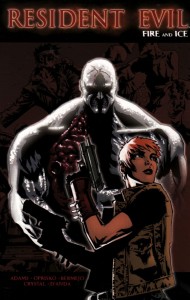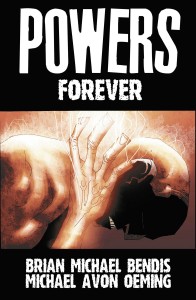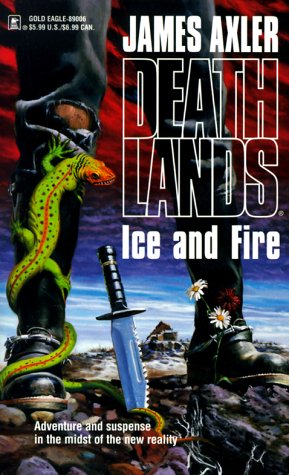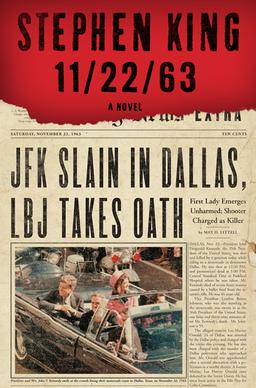 So you want to read a bad graphic novel? Allow to recommend Fire and Ice, a book that makes me look longingly back on the manga-style of the last few Resident Evil comics I’ve read. (Which, to be fair, is more a comment on my dislike of manga than on the quality of this book’s art. The troubles, as you will see, lie elsewhere.) So, it starts with some random characters that the authors seem confident I should be attached to despite them being uninteresting, overly soap-operaish in their equally uninteresting interrelationships, and never having been introduced before. The never-mentioned Charlie Team of S.T.A.R.S.[1] is off on missions to Mexico and Alaska to stop Umbrella from blah blah blah zombie-cakes. And yes, that’s the entire source of the title, is that some people went somewhere hot and set a fire while some other people went somewhere cold and I guess there was an avalanche maybe? Also a giant flying zombie penguin, because they live in the Arctic Circle now, apparently. Probably for the candy.[2] And then, after that series was over, I still had half the book left, in which possibly the characters could be developed a bit more and I could decide that, okay, there was a point after all.
So you want to read a bad graphic novel? Allow to recommend Fire and Ice, a book that makes me look longingly back on the manga-style of the last few Resident Evil comics I’ve read. (Which, to be fair, is more a comment on my dislike of manga than on the quality of this book’s art. The troubles, as you will see, lie elsewhere.) So, it starts with some random characters that the authors seem confident I should be attached to despite them being uninteresting, overly soap-operaish in their equally uninteresting interrelationships, and never having been introduced before. The never-mentioned Charlie Team of S.T.A.R.S.[1] is off on missions to Mexico and Alaska to stop Umbrella from blah blah blah zombie-cakes. And yes, that’s the entire source of the title, is that some people went somewhere hot and set a fire while some other people went somewhere cold and I guess there was an avalanche maybe? Also a giant flying zombie penguin, because they live in the Arctic Circle now, apparently. Probably for the candy.[2] And then, after that series was over, I still had half the book left, in which possibly the characters could be developed a bit more and I could decide that, okay, there was a point after all.
Yeah, no. Instead, there were a lot of very short (short enough that if they were sold as individual comics at today’s prices, I predict that a lot of punching occurred later) stories set between and before Resident Evil 1 and 2, mostly traveling backward through time, but not because of a cool literary trick that reveals more detail with each step backward, no, they’re just arranged oddly for no good reason. Some of them were slightly amusing, some of them were shitty retreads of stories told better by the actual game, item-collecting and steps-retracing[3] and all. Some of them were just not any good at all. In the only original story to which I attached any interest, the characters were anonymously killed at the end in a wry twist reveal that this particular outbreak predated all the games, which is why nobody ever heard about it. To be fair, I think that last one would have bothered me less if I had not been looking for a character to care about for the entire damn book.
I mean, aside from the flying zombie penguin.
[1] They were the folks who exposed the Umbrella conspiracy in the first game, and were basically all dead by the end, the few individual survivors working together under their own recognizance with no leadership structure anymore, so on top of the rest, there’s a pretty massive canon violation.
[2] I’ll take really, really obscure internet jokes for $600, Alex.
[3] “Hey, look, I should grab another part of this bomb that I haven’t mentioned needing to find, in case I want to set off a bomb later!” “Ooooo, I should take this key and go back to that locked door on the other side of the mansion from before!”


 I’m reading too many of these, and they are too similar, for much in the way of in depth reviews. So I think if you are interested at all, you’ve got the premise settled in your head by now, and I can just go with sense impressions, unless something vital changes. So, here’s what’s going on in
I’m reading too many of these, and they are too similar, for much in the way of in depth reviews. So I think if you are interested at all, you’ve got the premise settled in your head by now, and I can just go with sense impressions, unless something vital changes. So, here’s what’s going on in  You know how I was recently talking about running out of Stephen King books? Well, now it’s actually happened. I’m sure he’s still writing something, but there are no more plans floating around in the world for when the next one will come out. I have read an entire canon.[1] This particular book is his take on the big time travel questions, like “What would happen if you went back in time and killed Hitler?” or “What if you killed your own grandfather before he met your grandmother?”[2] or, predictably in the specific case of
You know how I was recently talking about running out of Stephen King books? Well, now it’s actually happened. I’m sure he’s still writing something, but there are no more plans floating around in the world for when the next one will come out. I have read an entire canon.[1] This particular book is his take on the big time travel questions, like “What would happen if you went back in time and killed Hitler?” or “What if you killed your own grandfather before he met your grandmother?”[2] or, predictably in the specific case of